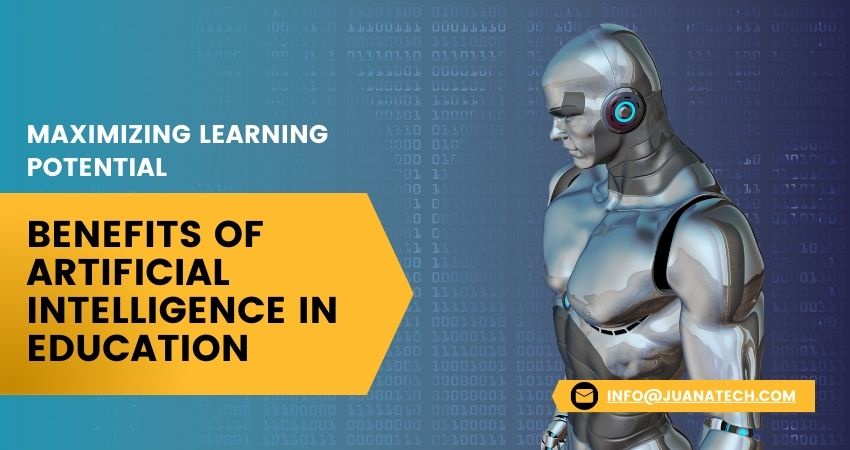Numerous sectors have been transformed by artificial intelligence (AI), and education is no exception. Artificial intelligence (AI) has emerged as a potent instrument in reshaping the educational environment thanks to its capacity to analyze enormous volumes of data, adapt to individual learning needs, and deliver personalized suggestions. In this article, we'll look at the benefits of Artificial Intelligence (AI) in Education.
1. Improvement of Personalised Learning
AI gives teachers the tools they need to give students individualized learning experiences. Educational systems may evaluate the abilities, limitations, and learning preferences of specific students by utilizing AI algorithms. With this knowledge, customized feedback, adaptive exams, and personalized content can be offered, allowing students to study at their own speed and reach their full potential. Personalized learning not only improves academic performance but also fosters student engagement and motivation.
2. Intelligent Tutoring
Using artificial intelligence (AI) in education systems can improve the teaching system. These systems can offer clarifications, offer real-time feedback, and recommend relevant resources based on the learner's performance and growth. Artificial intelligence (AI) instructors are able to pinpoint knowledge gaps and offer focused interventions to close them by analyzing data on student interactions. Intelligent tutoring systems provide a scalable answer for individualized training, opening up high-quality education to a wider audience.
3. Smart Content Creation
AI can automate the creation of educational content, freeing up valuable time for educators. Natural Language Processing (NLP) algorithms can generate quizzes, assignments, and even lesson plans based on specific learning objectives. AI-powered content creation tools can ensure the accuracy, relevance, and adaptability of educational materials, keeping them up-to-date with the latest advancements. Moreover, AI can assist in curating Open Educational Resources (OER) by identifying and organizing relevant resources from vast repositories.
4. Streamlining Administrative Tasks
Educators spend a significant amount of time on administrative tasks that could otherwise be utilized for teaching and mentoring. AI can automate administrative processes, such as grading assignments and managing student records, allowing teachers to focus on their core responsibilities. Machine Learning algorithms can efficiently evaluate and provide feedback on assignments, saving time and ensuring consistency. Artificial Intelligence (AI) in Education systems can also assist in scheduling, resource allocation, and student performance tracking.
5. Data-Driven Decision Making
By analyzing vast amounts of educational data, AI empowers educators and administrators to make data-driven decisions. Artificial intelligence (AI) systems can spot trends, forecast results, and offer insights to guide instructional techniques by analyzing data on student performance, engagement, and behavior. With the help of these insights, educational institutions may pinpoint pupils who are in danger, provide specialized interventions, and assess the efficiency of different teaching strategies. Making decisions based on data helps to better allocate resources and enhance educational results.
6. Intelligent Learning Analytics
AI-powered learning analytics tools provide valuable insights into student progress and engagement. By monitoring learner behavior and interactions with educational platforms, Artificial Intelligence (AI) in Education algorithms can identify areas of improvement, detect learning gaps, and recommend appropriate interventions. Intelligent learning analytics enable educators to track student performance in real-time, identify struggling students, and intervene proactively. This personalized support promotes student success and reduces dropout rates.
7. Virtual Assistants
Virtual assistants powered by AI technology offer round-the-clock support to students and educators. These assistants can answer questions, provide explanations, and offer guidance on various topics. They can also assist in language translation, helping students overcome language barriers. Virtual assistants enhance accessibility to educational resources and foster independent learning. By leveraging Natural Language Processing and speech recognition, these AI-powered assistants create a personalized and interactive learning experience.
8. Supporting Special Education
AI technologies have tremendous potential in supporting students with special needs. Speech recognition and NLP algorithms can assist students with speech and language disorders by providing real-time feedback and enhancing communication skills. AI-powered visual recognition systems can help individuals with visual impairments access educational materials by converting text into audio or braille. Personalized learning platforms powered by AI can adapt to the unique needs of students with disabilities, ensuring inclusive education.
9. Intelligent Content Recommendation
AI algorithms can analyze student preferences, learning patterns, and performance data to provide intelligent content recommendations. By understanding the individual needs and interests of students, AI-powered systems can suggest relevant educational resources, reading materials, and online courses. This personalized content recommendation enhances learner engagement, encourages self-directed learning, and broadens students' knowledge beyond the curriculum. Students may study a variety of topics and interests thanks to artificial intelligence (AI) in education, developing a passion for lifelong learning.
10. Adaptive Assessment and Testing
Traditional testing methodologies are being revolutionized by AI-powered adaptive assessment systems. These systems ensure a more accurate evaluation of knowledge and abilities by adjusting the level of difficulty and the topic of the questions based on the student's performance. Adaptive testing offers a specialized and effective evaluation approach by constantly modifying the exam based on the students' replies. It does away with the "one size fits all" philosophy and offers each student a fair and thorough assessment process.
11. Collaborative Learning and Virtual Classrooms
AI facilitates collaborative learning experiences through virtual classrooms and online platforms. AI-powered tools enable seamless communication, collaboration, and knowledge sharing among students and educators. Virtual classrooms offer features such as video conferencing, shared whiteboards, and collaborative document editing, creating an interactive and engaging learning environment. Artificial Intelligence (AI) in Education can also facilitate group formation, matching students with complementary skills and learning styles, and promoting effective teamwork and peer learning.
12. Continuous Professional Development for Educators
AI supports the ongoing professional development of educators by providing personalized learning opportunities. AI-powered platforms can recommend relevant courses, workshops, and resources based on the teacher's interests, experience, and goals. These platforms can also analyze teacher performance data and provide feedback for improvement. By leveraging AI in professional development, educators can stay updated with the latest teaching methodologies, trends, and research, enhancing their instructional effectiveness and promoting lifelong learning among teachers.
Unlocking the Transformative Power of Artificial Intelligence in Education
Artificial Intelligence (AI) in education has a wide range of advantages, including individualized instruction, intelligent tutoring, clever content creation, streamlined administrative tasks, data-driven decision-making, intelligent learning analytics, virtual assistants, special education support, and much more. Education may be made more approachable, interesting, and efficient for students from all backgrounds and abilities by utilizing AI. But it is essential to approach AI adoption in education with care, making sure that ethical practices, data protection, and human oversight are maintained. The potential for artificial intelligence to improve education is enormous as it continues to develop.


No comments yet